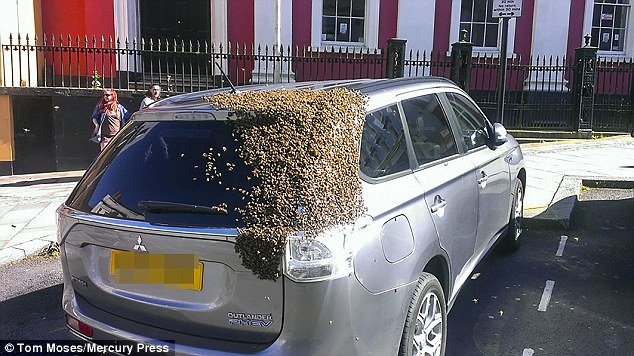Swarm Of 20,000 Bees Follows Car Around For Two Days After Their Queen Gets Stuck In The Boot

Carol Howarth, 65, was amazed when the swarm flew down onto her silver Mitsubishi Outlander with up to 20,000 of the insects covering the boot.
A team of three beekeepers, a national park ranger and passers-by helped capture the swarm in a box while Carol was away from the car shopping.
She drove off in her 4x4 - but hundreds more of the bees then followed her the two miles home.
Mrs Howarth said: 'It was incredible really. I've never seen anything like it - it just goes to show the power of nature.'
The grandmother had parked her Mitsubishi in the town centre in Haverfordwest, Pembrokeshire, at lunchtime on Sunday for a shopping trip.
But while she was away, the thousands of bees suddenly swarmed down to cover the boot of her car - and passers-by were amazed at the buzzing spectacle.
While she was away, the rescue squad managed to capture the swarm in a special bee-keepers box.
She drove off thinking the drama was all over - but some of the swarm decided to follow her home. She then had to call out beekeepers again on Monday at 6pm to box up the rest.
Carol said: 'One theory was that the queen was trapped in my car and the swarm were following her.
'But they couldn't find the queen anywhere so I've no idea if that was right.
'Apparently bees can swarm at this time of the year and it is a very strong instinct for them to follow the queen.'
Carol arrived back at her car after a passing National Park ranger spotted the bizarre 'brown splodge' on the car parked outside a pub.
She added: 'When I got back it was all over - or so I thought. I drove off without thinking about it too much, to be honest.
'But then the next day I realised that some of the bees had followed me home. There were a lot less than the first swarm.
'I still don't really understand why because they couldn't see the queen anywhere. Perhaps they just like the heat of my car.'
Roger Burns of Pembrokeshire Beekeepers was one of those called to help try and get rid of the swarm.
Mr Burns, a 65-year-old retired doctor, said: 'We think the queen had been attracted to something in the car, perhaps something sweet, and had got into a gap on the boot’s wiper blade or perhaps the hinge.
'The swarm of around 20,000 had followed her and were sat around on the boot of the car. I brought over a cardboard box and carefully brushed them into there as quickly as possible as I was aware it was a big swarm in the middle of the high street.
'I got about 15 or 20 stings for my trouble. I then left the cardboard box on the roof while we waited for the last few hundred bees to leave the boot but then a gust of wind blew it off and the queen fled back to the boot again.
'Unfortunately I had to go to dinner so another beekeeper took up the watch however eventually the car owner returned and drove off without realising the queen was still hidden in the back.
'I think the owner must have been a bit scared of the swarm that was hanging around and just wanted to get away without realising they were attracted the car because of the queen.
'We were left with a swarm of queen-less bees in the box and then heard that the same car was spotted the very next day with a swarm all over the boot, still chasing it.
'I have been beekeeping for 30 years and I have never seen a swarm do that. It is natural for them to follow the queen but it is a strange thing to see and quite surprising to have a car followed for two days. It was quite amusing.'
Mr Moses was one of the first people on scene and being a discovery ranger at Pembrokeshire Coast National Park, knows how vital bees are so wanted to help.
He called up numerous beekeepers who lent a hand trying to lure the bees into the cardboard box.
Mr Moses, who also lives in Haverfordwest, said: 'As I drove past I noticed this big brown splodge on the back of a car.
'I had seen swarms before settle on things like this but never one as large as this. It was quite a thing to see - certainly a "wow" moment.
'I was really worried that someone could get hurt by them or that someone might damage them in their bid to clear the car so I stopped to help out.
'I got a handful of stings to my head, neck and the back of my ears, but I’ve had some anti-histamines and they are not too bad now.
'I was pleased to have been able to help out the bees as we need to look out for them as they face increasing pressures from humans but I know how important they are for our existence.'
Related News


